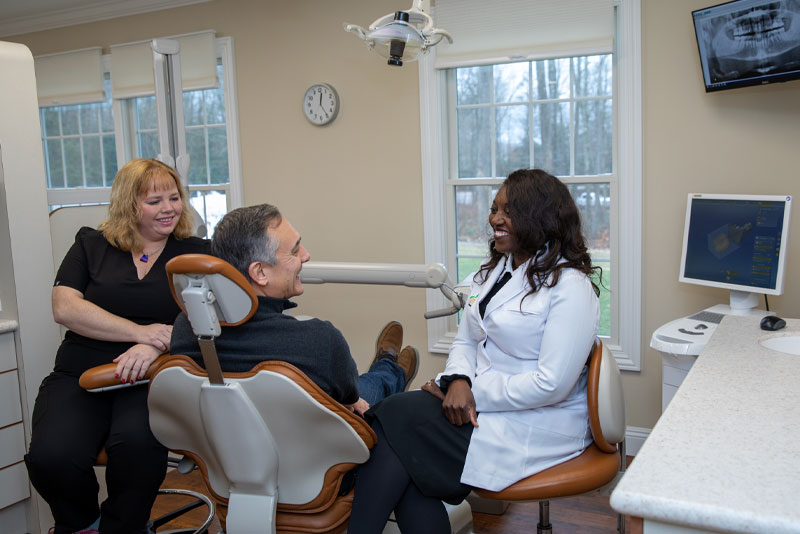Your Home for Periodontics
The soft tissues of your mouth are closely connected with the health of your teeth and jawbones. They can affect your ability to live a normal daily life. They can even compromise your systemic health. The good news is, most gum-related complications are avoidable. Brush and floss your teeth regularly. Avoid all tobacco products. And come to Litchfield Hills Family Dental for regular checkups and cleanings. If you do develop issues related to your soft tissues, we can provide an extensive range of periodontal treatments for your family. When you’re looking for periodontics in Torrington, CT, think Litchfield Hills Family Dental.

Key Periodontal Treatments
Our doctors have 50 plus years of combined experience in dentistry and are highly trained and skilled in periodontics. We offer multiple periodontal services, including minimally invasive laser-based options, in one convenient office:
Hardened dental plaque can build up on your teeth below the gumline. Left unchecked, this calculus can cause the gums and the teeth to separate, creating deep pockets between them. With scaling we scrape away that buildup. Afterward we perform root planing. This means smoothing down the root enamel to prevent bacteria from forming in crevices and to allow your gums and teeth to reconnect.
When your gums separate from your teeth it can indicate an infection on the teeth underneath the gums. Bacteria-releasing tartar and calculus are the typical culprits. We can eliminate both with a gingivectomy—removing any diseased tissue and signs of infection to allow gum reattachment. Using our laser technology, we can perform this procedure without scalpels or sutures!
Unchecked gum disease can permanently damage your gums and jawbone. When you reach this stage, your only treatment option is osseous (flap) surgery. For this we access your tooth roots and jawbone by making a small hole in your gums. Through that opening we remove the diseased tissue, repair any bone damage, eradicate bacteria, and medicate the pockets. Lastly, we seal up your gums so they can heal and resume protecting your teeth.
Gum disease isn’t curable, but we can manage it. After you finish your primary gum disease treatment, we’ll have you return for recurring periodontal maintenance—typically three or four times per year. During these visits we’ll do additional scaling and root planing as needed to remove any bacteria which may have accumulated since your previous treatment.
Your tongue is attached to the bottom of your mouth by a slender tissue. As is your upper lip to your upper gums. If these tissues are too short, they can affect your ability to eat and speak comfortably. You may also be unable to receive orthodontic treatment. With a laser frenectomy, our team removes these constricting tissues to give your tongue and lip free, natural movement without using scalpels, drills, or needles. This procedure is especially important for normal development in children. Tongue-tie, when the frenulum below the tongue restricts its movements, can cause problems with breathing, swallowing, speech, and nursing. Minimally invasive Fotona laser technology corrects this in just minutes.
Gum recession has a variety of causes. When it happens, you may become more prone to tooth and bone loss. Your teeth also become sensitive and appear unevenly sized. This can also make your teeth become extremely temperature-sensitive and your gum coverage uneven. To treat this, we take small pieces of soft tissue from the roof of your mouth or teeth with excessive gum coverage and attach them to the recessed areas. These tissue grafts will gradually fuse with the rest of the gum tissue and alleviate your symptoms.
To help you heal after gum grafting, we use plasma-rich growth factors (PRGF) drawn from your own blood. Reintroduced into your gum graft site, PRGF can accelerate your healing. We can also restore your jawbone after recession or gum disease with guided tissue regeneration. Since gums heal quicker than bone, we position a natural tissue membrane between the two to allow them to heal fully without interference from one another. Many practices that offer periodontics don’t offer these advanced yet natural healing options.
Dental implants are designed to last. However, if the surrounding tissue becomes infected—a condition called peri-implantitis—your implants can loosen, become misaligned, and even fall out. The underlying bone can follow. Additional treatments including implant replacement then become necessary. Our team can restore your implant—and your smile—through deep cleaning, diseased tissue removal, and bone grafting.
Our laser technology enables us to eradicate bacteria and infection from beneath your gums and plaque or tartar buildup from your tooth roots without damaging surrounding healthy tissue. The laser instantly destroys the bacteria as we guide it across the treatment area! If we stop your gum disease soon enough, we can help you avoid osseous surgery.

-
Current Patient:
(860) 496-0256 -
New Patient:
(860) 421-6577